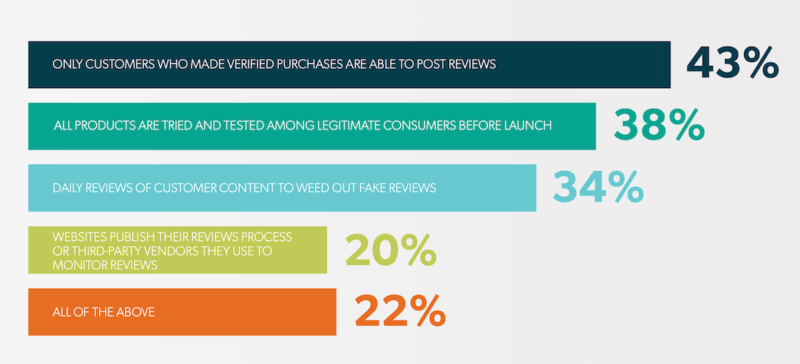Consumers are calling for protection from fake reviews. That’s one of the key findings from a new survey from Bazaarvoice. The company polled roughly 10,000 consumers in the U.S., U.K., France, Germany and Australia and discovered that 72% of consumers want retailers to take stronger action and create standards to prevent deceptive or fraudulent reviews.
Concrete steps against fraud. The majority in the survey wanted only verified purchasers to be able to post reviews. They also asked for product testing and daily review of user-generated content to “weed out fake reviews.”
Steps consumers want retailers to take against fraud

The survey also explored how fake reviews impact brand trust and what consumers believe should be the consequences for deceptive reviews. The trust discussion is familiar; according to the survey:
- If consumers suspect fake reviews 54% say they won’t buy the product.
- Fake reviews will cause a loss of trust in the brand (34%).
- Once brand trust is lost, 82% wouldn’t buy from that brand again.
Tough financial penalties. In terms of penalties, U.S. respondents said brands that violate “these standards” (review integrity) should face a fine equivalent to roughly 15% of their annual revenue. Bazaarvoice points out that would be 4x the General Data Protection Regulation (GDPR) penalty formula.
Asked how they identify fake reviews, respondents said they look for multiple reviews with “similar wording” or where review content doesn’t closely match the product. They also notice “bad grammar or misspellings.” Finally, and perhaps the most common as an indicator of fraud or trust, they notice whether there are too many positive reviews.
Review red flags

Negative reviews help brand credibility. A nearly identical point was made in another survey released this week from TrustPilot. In that survey, consumers expressed skepticism of an excess of 5-star reviews. A majority of those survey respondents said they “would prefer to buy a product with a large number of reviews and an average rating over a product with a small number and excellent rating.”
In the Bazaarvoice survey, 62% of respondents said they consider negative reviews “as important as positive reviews” in their purchase decision-making. This is undoubtedly because they want to know about product-related issues or problems but also because negative or critical reviews confer credibility on positive ones.
Why we care. Multiple surveys show that consumers are more dependent on reviews than ever. However, they’re also becoming more wary of fraud. It’s not unlike the phenomenon of people not trusting Facebook but also not being able to quit it either. And while this survey focused on retailers (Bazaarvoice’s customers) its findings would presumably extend to platforms and marketplaces.
Marketers are often in a hurry to amass reviews, but it’s in everyone’s interest to police and not use unethical tactics to solicit them. Merchants that don’t ensure the integrity of their reviews may see short-term gain but likely will suffer longer-term brand erosion.

